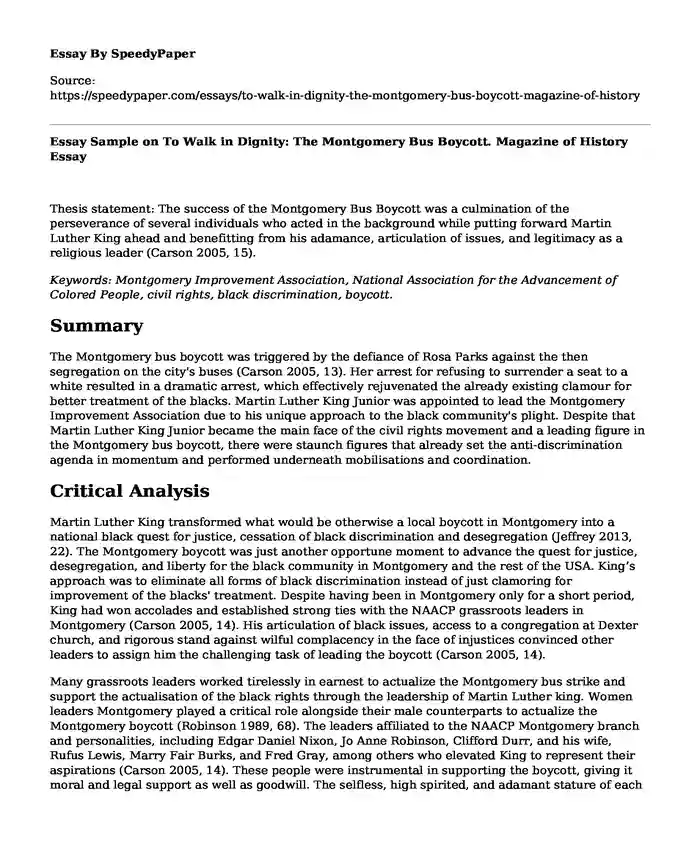
| Type of paper: | Essay |
| Categories: | Society Martin Luther King Civil rights |
| Pages: | 3 |
| Wordcount: | 758 words |
Thesis statement: The success of the Montgomery Bus Boycott was a culmination of the perseverance of several individuals who acted in the background while putting forward Martin Luther King ahead and benefitting from his adamance, articulation of issues, and legitimacy as a religious leader (Carson 2005, 15).
Keywords: Montgomery Improvement Association, National Association for the Advancement of Colored People, civil rights, black discrimination, boycott.
Summary
The Montgomery bus boycott was triggered by the defiance of Rosa Parks against the then segregation on the city's buses (Carson 2005, 13). Her arrest for refusing to surrender a seat to a white resulted in a dramatic arrest, which effectively rejuvenated the already existing clamour for better treatment of the blacks. Martin Luther King Junior was appointed to lead the Montgomery Improvement Association due to his unique approach to the black community's plight. Despite that Martin Luther King Junior became the main face of the civil rights movement and a leading figure in the Montgomery bus boycott, there were staunch figures that already set the anti-discrimination agenda in momentum and performed underneath mobilisations and coordination.
Critical Analysis
Martin Luther King transformed what would be otherwise a local boycott in Montgomery into a national black quest for justice, cessation of black discrimination and desegregation (Jeffrey 2013, 22). The Montgomery boycott was just another opportune moment to advance the quest for justice, desegregation, and liberty for the black community in Montgomery and the rest of the USA. King’s approach was to eliminate all forms of black discrimination instead of just clamoring for improvement of the blacks' treatment. Despite having been in Montgomery only for a short period, King had won accolades and established strong ties with the NAACP grassroots leaders in Montgomery (Carson 2005, 14). His articulation of black issues, access to a congregation at Dexter church, and rigorous stand against wilful complacency in the face of injustices convinced other leaders to assign him the challenging task of leading the boycott (Carson 2005, 14).
Many grassroots leaders worked tirelessly in earnest to actualize the Montgomery bus strike and support the actualisation of the black rights through the leadership of Martin Luther king. Women leaders Montgomery played a critical role alongside their male counterparts to actualize the Montgomery boycott (Robinson 1989, 68). The leaders affiliated to the NAACP Montgomery branch and personalities, including Edgar Daniel Nixon, Jo Anne Robinson, Clifford Durr, and his wife, Rufus Lewis, Marry Fair Burks, and Fred Gray, among others who elevated King to represent their aspirations (Carson 2005, 14). These people were instrumental in supporting the boycott, giving it moral and legal support as well as goodwill. The selfless, high spirited, and adamant stature of each of the often not mentioned personalities sustained the boycott and made it easy for King to articulate issues boldly.
The Montgomery Improvement Association, which King would lead through the boycott and use as a platform thrust into the national limelight as a civil rights crusader, was a culmination of a highly coordinated network of actors. Blacks' lawyers, mobilizers, advisors, and the populace had been whipped to support the course. The person of Martin Luther King was, however, critical in articulating the issues due to his unrivalled oratory skilled and influence in the church community as a young priest (Carson, 2005, 15). Without the oration, astuteness, boldness of King, it would have been challenging for the other mobilizers to overcome the daunting barriers put by the white supremacists against the black movements. Having a background in ministry and church, sheer influence in the religious fraternity gave King a legitimacy as a leader. In his role as MIA leader, he cut the image of a religious figure, leading a form of awakening among the black community. The MIA organizers understood that bluntly confronting the blacks would defeat their long term goal of securing black freedom. King delivered on this and set the ground for incredible progress in the civil rights movement.
The reading "To Walk in Dignity" by Clayborne Carson demystifies that Martin Luther King was not acting alone during the Montgomery bus Boycott but rather was a face of the many personalities who performed incredible roles to realize its success.
References
Carson, Clayborne. To Walk in Dignity: The Montgomery Bus Boycott. Magazine of History; Jan 2005; 19, 1; ProQuest Central.
Jeffrey, Gary. 2013. Rosa Parks and the Montgomery Bus Boycott. New York: Gareth Stevens Pub. http://search.ebscohost.com/login.aspx?direct=true&scope=site&db=nlebk&db=nlabk&AN=615062.
Robinson, Jo Ann Gibson. 1989. The Montgomery bus boycott and the women who started it: the memoir of Jo Ann Gibson Robinson. Knoxville, Tenn: University of Tennessee Press.
Cite this page
Essay Sample on To Walk in Dignity: The Montgomery Bus Boycott. Magazine of History. (2023, Aug 24). Retrieved from https://speedypaper.net/essays/to-walk-in-dignity-the-montgomery-bus-boycott-magazine-of-history
Request Removal
If you are the original author of this essay and no longer wish to have it published on the SpeedyPaper website, please click below to request its removal:
- Martin Luther King - Essay Sample
- Were the Founding Fathers Wrong When They Wrote All Men Are Created Equal? Free Essay
- Essay Sample: Women Character/Gender Relationship in Interpreter of Maladies
- Essay Sample - Good Country People
- Overcoming Challenges Faced by Transgender Individuals and Community - Essay Sample
- Political Cartoon Analysis: Where's the Drain - Free Paper Sample
- Contemporary Issues on Indigenous Basketball Team - Paper Example
Popular categories




